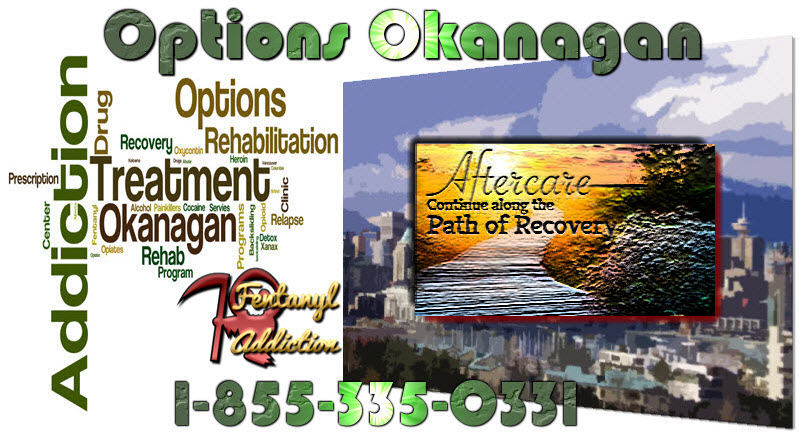The importance of continuing care and aftercare in addiction treatment in Vancouver, Victoria and Kelowna, British Columbia. – Options Okanagan Treatment Centers in Kelowna, British Columbia treating opiate, fentanyl and alcohol addiction and recovery.
Aspects of a Typical Aftercare Program
Group meeting sessions are generally scheduled when it is convenient for the patient’s schedule. Programs can include practical instruction, group support and interactive process sessions.
Sessions may include some of the follow elements, though this list is by no means all inclusive.
1) Skills needed to prevent relapse
2) Preparing to understand the risks and problems of recovery
3) Developing relationship skills
4) Managing the stress, anxiety and anger that oftentimes follows an addiction
5) Family dynamics
6) Learning coping mechanisms for dealing with the issues related to going sober
7) Preparing to address triggers.
8) Reminders of activities that have proven helpful to maintain serenity in a frantic or tempting environment.
9) Learning from those who have successfully achieved sobriety.
10) Job skills development.
Some aftercare programs may also include retreats and recreation activities at various points in the year.
However, it should be noted that random and infrequent testing for drug or alcohol consumption may also be a part of an aftercare program.
Alumni/aftercare usually include alumni of aftercare programs who have community leaders since recovery. These people oftentimes serve as valuable resources to new aftercare patients, helping them work towards employment opportunities and serving as role models.
Adolescent Aftercare Program for Substance Abuse
Programs aimed at young adults recovering from substance abuse problems are geared towards the needs of the individuals recovering from substance abuse who find themselves needing to accept personal responsibility. These aftercare programs emphasize recovery from substance dependence, as well as academic components, responsibility as an important element of young adulthood and recreation as important elements of a healthy life without drugs or alcohol.
A major part of any adolescent aftercare program involves recovery. The young person must learn to:
a) Understand their problem and learn how to prevent relapses.
b) Recognize their own feelings and control emotional responses to triggering events.
c) Learn to recognize irresponsible thought patterns and their connection to substance abuse.
d) Participate in recreational activities as a means of warding off boredom and increasing the chances of a relapse.
The process of developing a solid sense of personal responsibility tends to call for:
1) Understanding how one’s emotions interact with the people around them, particularly family members.
2) Developing healthy habits on a structured daily schedule.
3) Goal setting and rewards intended to develop positive self esteem in people.
4) The development of healthy personal habits.
Recreation is also a fairly essential part of aftercare programs geared towards adolescents and young adults as being bored is a chief trigger for a relapse. Aftercare recreational programs are intended to show patients how to enjoy themselves without drugs or alcohol. With year round opportunities for recreational activities, clients can develop anything from regular exercise routines to learning new hobbies and developing new interests.
Lifetime Aftercare.
Patients who have completed a primary care program at certain treatment facilities may also participate in programs known as lifetime aftercare, also called weekly aftercare meetings.
Lifetime aftercare generally consists of regularly scheduled group meetings facilitated by a trained counselor. This counselor assists patients in meeting their personal recovery plans and offers guidance towards their efforts at recovery. The group meeting structure provides patients with support and feedback from the facilitator and other participants, as well as a place where they can learn about their daily problems and issues, as well as their successes.
Alumni meetings and events, ranging from picnics to activities to new client sponsorships are also a major part of a number of lifetime aftercare programs. Ongoing support in these aftercare programs tend to involve staff, patients, families, alumni and the community itself.
If you need help locate a rehab aftercare program for you, your teen, family members or friends, call 1-855-335-0331.
Options Okanagan Opiate and Alcohol Treatment Centers in Kelowna, Salmon Arm and Vancouver, British Columbia – Men and Women are recovering and healing from Alcohol and Drug Abuse at our treatment center here in the Okanagan right now.
Our unique and distinctive Opiate Drug and Alcohol treatment program allows men and women to come in from Calgary as well as Edmonton as we offer airport pickup.
Numerous clients come to us from Vancouver, Calgary and Edmonton and other locations in Alberta and even other provinces for Opiate addiction treatment, heroin drug treatment, many other drug and alcohol addictions for rehabilitation because of the uniqueness of our treatment center.
Our Treatment Location:
Options Okanagan Drug and Opiate Treatment Center
551 Sherrydale Crescent, Kelowna, British Columbia, V1V 2E6
Toll Free Phone Number : 1-855-335-0331




